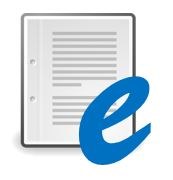As of 1 April a new act will require all invoicing for purchases in the public sector to be done by e-invoice

As of 1 April 2019, there is a legal requirement that all purchases in the public sector be invoiced by e-invoice. SLU has been sending and receiving e-invoices for several years, the biggest change will be for suppliers who do not yet use e-invoicing.
The new act will require all invoicing for purchases in the public sector (state, municipalities and county councils) to be done by electronic invoice (e-invoice). An e-invoice is an invoice issued, sent and received in a structured electronic format to enable automatic and electronic processing. A pdf file does not count as an e-invoice.
The new act:
- applies to suppliers both in Europe and elsewhere, that is regardless of where the supplier is located. The recommended e-invoicing standard is a joint European standard, which means that sending e-invoices should not be a major problem for suppliers based abroad;
- does not apply retroactively - if the supplier has signed an agreement with SLU before 1 April 2019, and that agreement does not require e-invoicing, the supplier can continue to send invoices as before provided they concern that agreement;
- only applies to invoicing of purchases, not such as certain kinds of fees (please note that conference fees etc. count as purchases).
How the new requirement affects SLU, our suppliers and customers
When SLU buys under an agreement concluded after 1 April, the supplier must use e-invoicing. This also applies in cases where there is no agreement, e.g. when buying from a shop using a requisition. In the same way, SLU must send e-invoices to other public sector agencies when they buy from us.
SLU has been sending and receiving e-invoices for several years, which means the act will not involve any major changes for us. The biggest change will be for suppliers who do not yet use e-invoicing. The same applies to those of our customers within the public sector who currently do not accept e-invoices.
Information to suppliers after 1 April
In procurements
In all procurements, we must specify e-invoicing as a requirement to ensure all our suppliers comply with this legal requirement.
Orders done in Proceedo
Orders and requisitions done in Proceedo contain information on how to invoice SLU. This information will be updated on 1 April to make sure it complies with the new legal requirement.
Orders placed outside Proceedo
If orders are placed outside Proceedo, make sure to inform the supplier that invoices should be sent electronically and be made out to SLU Fakturamottagning, Box 7090, 750 07 Uppsala. Refer them to the SLU web, https://www.slu.se/en/about-slu/ongoing-procurements/invoice-address/, where they can find information on how to invoice SLU. The page is available in Swedish and English.
More information on mandatory e-invoicing and questions and answers
On the staff web, there is a page on Mandatory e-invoices in the public sector. This page contains information on e-invoicing targeted at SLU staff. The page also has a Q&A section where you can find out what happens when a supplier sends a hardcopy or pdf invoice after 1 April, and what information you can give a supplier who claims they cannot send e-invoices.
For external parties, there is information on the SLU website: Invoice address and handling of invoices.